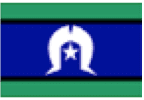SSRV Community Lawyer, Liz Divers, gives an update for people who are involved in the Centrelink Robodebt action.
Did you know?
Centrelink has many requirements of people who seek assistance
A disaster, such as a bushfire or a flood, can take away your home, your business, or the business you work for. Sadly, disasters happen all too often in Victoria.
Some people have their first experience with Centrelink after a disaster. For example, they may apply for Jobseeker payment, a disaster payment, or a crisis payment.
Centrelink has many requirements of people who seek assistance, including:
· Identification documents
· Financial information
· Information about family relationships
To be ready for such a situation, it’s a good idea to have your important information easily accessible to take with you in the event you need to flee a disaster. You could also consider securely storing the information online.
For example, think about:
· Can you access your bank account if you don’t have your own phone or computer?
· Would you remember who you’re insured with if all your documents are gone?
· How will you go with 100 points of ID?
These are challenging things to think about but – especially if you live in a bushfire or flood zone – its best to think about them before disaster strikes, rather than afterwards.
Our Disaster Preparedness and Response Plan will tackle this challenge from a range of perspectives. Find out more.
DSP Help project: its impact and plans for the future
Over the past two years SSRV has been working on our DSP Help Project, using human-centred design and technology to build a resource that applicants, support workers, health workers and others can use to better understand the Disability Support Pension (DSP) application and appeals processes. We gratefully acknowledge that the Project has been funded by the Victorian Legal Services Board Grants Program.
As the project winds up, we’d like to take a moment to talk about what’s been achieved and look at the future of DSP Help.
What did we do?
The core of the DSP Help Project was the creation of the online resource: https://dsphelp.org.au/. Designed with the needs of DSP applicants and those supporting them in mind, DSP Help provides information and guidance to help navigate the DSP application and appeals processes.
The website includes:
Information about DSP eligibility and supporting medical evidence.
A medical evidence chatbot applicants can use to generate a customised evidence kit they can take to their doctors when seeking a letter or report in support of their application.
Information about appealing a rejected application.
Resources for doctors and other health workers who may be producing medical evidence for applicants.
Links to get further help from SSRV where needed.
The project was supported by and complemented SSRV’s legal practice. Some people need more assistance than a website can offer, and the DSP Help Project was able to assist them by resourcing a dedicated community lawyer to help provide advice and representation for people appealing DSP rejections.
What did we achieve?
In the two years we ran the DSP Help Project:
- More than 30,000 people made use of the DSP Help website.
- Almost 3,500 people used the medical evidence chatbot, and more than 2,000 created customised medical evidence kits to support their application or appeal.
- 191 legal services were delivered to individuals, including 18 representations at the Administrative Appeals Tribunal.
- Community Legal Education was delivered to almost 300 community, support and other workers helping people with the DSP.
Download the DSP Help Project Year Two report,
What’s in store for the future?
While the project may have come to an end, DSP Help and SSRV’s work in this space has not. The DSP Help website will remain online, so please, if you or someone you support needs information about the DSP please visit https://dsphelp.org.au/.
The DSP will likely remain one of the biggest reasons people get in touch with us and our lawyers will continue to provide advice and casework to people appealing rejected applications. If you or someone you support needs assistance, please contact us.
Get in Touch
SSRV is a state-wide community legal centres that provide specialist legal advice and assistance regarding Centrelink matters. DSP Help is part of the range of services offered by SSRV, including:
Legal Assistance Line (for individuals and carers): 03 9481 0355
Worker Help Line (for support workers and health professionals): 03 9481 0655
Or visit our websites:
Senate Inquiry into the Purpose, Intent and Adequacy of the DSP: Report Released
In May 2021 the Senate referred an inquiry into the purpose, intent and adequacy of the Disability Support Pension (DSP) to the Senate Community Affairs References Committee. The Committee has now reported back on the Inquiry. Here’s what SSRV called for and what the report recommended.
You can read the full report here.
How was SSRV involved?
We knew we wanted to be a part of the inquiry process right from the outset. The DSP is such a big part of the work SSRV does – in fact, it’s the single biggest issue people call us about – and we knew our expertise and experience, and that of our clients would be incredibly valuable to the Committee.
Led by our DSP Help Project, SSRV developed a submission to the Inquiry highlighting issues in three main areas:
1. The DSP eligibility criteria and the challenges this creates for people living with disability trying to access income support.
2. Issues people have understanding the DSP eligibility criteria and how this is communicated to applicants and those supporting them, and in particular the challenges this creates when applicants seek to gather medical evidence to support their application.
3. Issues with how the DSP is administered, including challenging appeals processes and delays in processing applications.
Our submission16 recommendations. Notably, SSRV called for:
· Removing the requirement for conditions to be ‘fully’ diagnosed, treated and stabilised.
· Removing ‘Program of Support’ from the DSP eligibility criteria.
· Reintroducing the ‘Treating Doctor’s Report’ or introducing a similar mechanism to make collecting medical evidence easier.
You can read our full submission here (submission 90).
The DSP Help Project
While the Inquiry was running SSRV was also continuing with our DSP Help Project, using human-centred design and technology to help applicants understand the complex criteria and evidentiary requirements for making a successful DSP application.
In this year of the project our focus was on doctors and other health workers, and designing our resources in way that makes their role in providing suitable medical evidence in support of an application clearer.
The consultation undertaken as part of this project revealed experiences that we felt needed to be shared with the Committee in addition to the Submission described above. SSRV approached the Committee to see if this was possible, then worked with Paper Giant, the service design consultancy working on DSP Help, to develop a supplementary submission. You can read this here (submission 90.1).
What’s in the report?
It is fantastic to see the Committee adopt in substance many of the reforms and recommendations SSRV and the broader sector have been calling for. In particular, the requested reviews of the eligibility criteria are very welcome.
SSRV is also glad to see the contributions of many people we regularly work with featuring so prominently in the report, including Economic Justice Australia’s (EJA) Linda Forbes, Australian Federation of Disability Organisations’ (AFDO) Patrick McGee and SSRV’s own DSP Help Community Lawyer Dermott Williams.
Dermott was invited to participate in one of the Inquiry’s hearings, appearing with Linda Forbes as a representative of an EJA member centre. Dermott used the opportunity to amplify the voices and experiences of DSP applicants trying to access the pension, and highlighted the difficulties they face in accessing clear and complete information about the eligibility criteria they are being assessed on. She also took the opportunity to reiterate key recommendations from SSRV’s submission, including the need to remove ‘Program of Support’ from the eligibility criteria.
SSRV looks forward to seeing the report recommendations actioned and implemented, but anticipates further advocacy work will be required in the coming years to help make the DSP a fairer and easier to access payment. For further information, check out EJA’s media release.
If you need help with the DSP
For assistance in understanding the DSP, gathering evidence and making an application, or appealing a rejection, please visit DSP Help.
If you need legal assistance for the DSP or another social security issue please call.
Individuals – Legal Assistance Line: 03 9481 0355, Monday to Friday, 9am to 1pm and 2pm to 5pm.
Workers can phone SSRV’s Worker Help Line: 03 9481 0655, Monday to Friday, 9am to 5pm.
Staff Profile: Nhirushni Somasundaram, community lawyer
I am community lawyer at SSRV and my area of work focuses on assisting individuals who are victims of family violence as well as those who have been impacted by the COVID-19 pandemic navigate our complex social security system.
I am very passionate about ensuring that all individuals receive an adequate income through which they can enjoy a decent standard of living, irrespective of any vulnerability or disadvantage they face.
The COVID-19 pandemic has highlighted the importance of ensuring that we have a more accessible social security system in order to create a fair and just society. Through my work at SSRV, I have been able to assist the most vulnerable members of our community and empower them to understand their rights to social security payments.
I have also had the privilege to contribute to the development of students entering the legal profession by being involved in the Social Security Advocacy Clinic in partnership with Monash University.
Although I grew up in Melbourne, I am extremely thankful to my parents who made the difficult decision to give up their life in Sri Lanka and move to Australia in order to give my siblings and I a life that was not marred by a civil war.
Outside of work, I am passionate about giving back to the community and enjoy volunteering at events such as the Good Friday Appeal. I am also an avid runner, having completed two half-marathons. When I am not running, I love spending time with my furry friend, Ella, who constantly demands treats in return for spending time with me.
SSRV Stories: Annarietta
Annarietta* is living with chronic fatigue syndrome, and also a spinal condition that can limit movement of the back and neck and cause blood pressure problems. She also experiences mental health issues.
She was receiving the Disability Support Pension (DSP) in the early 2000s but lost eligibility when she moved overseas for several years. On returning to Australia, Annarietta attempted to engage in paid employment but found her condition made it impossible and eventually applied for the DSP again.
Annarietta’s application was rejected by the original decision maker, the Centrelink Authorised Review Officer, and the first tier of the Administrative Appeals Tribunal (AAT). She had appealed this decision to the second tier of the AAT and had been through a number of conferences as part of the process. During these conferences representatives for Services Australia maintained that Annarietta was not eligible for the DSP. That’s when Annarietta sought assistance from SSRV. An SSRV community lawyer assisted Annarietta to prepare submissions ahead of her hearing and had planned to represent her at the hearing itself.
Fortunately, following the submissions, Services Australia’s representatives offered to settle the matter before the hearing proceeded, agreeing that she should receive the DSP.
SSRV worked with Annarietta to ensure this agreement was implemented in a timely fashion.
It had been three years between the initial claim and Services Australia agreeing Annarietta was eligible.
In that time, Annarietta was reliant on JobSeeker Payment. She was required to either look for work she knew she wouldn’t be able to perform, or get regular medical certificates from her doctors explaining that she can’t work. If not for the temporary rate increase during the early stages of the COVID-19 pandemic, she also would have been on a lower rate of payment than that to which she was entitled.
Annariette told SSRV that the entire process had been traumatic and has worsened her conditions.
Annarietta has the capacity to do some work, provided she is afforded flexibility. She believes this capacity to work has been diminished by the worsening of her conditions, and this would not have happened if the process had not been drawn out to such an extent.
Annarietta’s experience was fed into SSRV’s systemic policy activities, and in particular into our submission to the Senate Community Affairs Committee Inquiry into the purpose, intent and adequacy of the Disability Support Pension.
Annarietta’s story highlights the challenges created directly by being on the wrong payment, which sit on top of the other challenges people living with disability face. These can be exacerbated by the length of time the process takes.
Annarietta hopes that sharing her experiences will help others in her position.
Stories like Annarietta’s are not uncommon amongst SSRV’s clients. We generally tell clients to expect a DSP application to take at least three months to be processed, but many take longer. By the time a matter reaches the AAT’s General Division (Tier 2) it would be uncommon for less than a year to have passed since the initial application. And in that time the pressures of life, of living on less adequate income, and of having to engage with activities beyond their capabilities or risk losing that income, all add up.
It’s important to note that this matter was concluded by agreement. That is, representatives for Services Australia decided they agreed that Annarietta should be on the DSP and that they would not contest the hearing.
This is a great outcome for our client, and it shows the value in having a lawyer with social security expertise advocating on an applicant’s behalf; it was, after all, the submissions SSRV prepared that led to this outcome.
But it’s also an example of a matter that could have – and should have – been resolved much earlier and with much less stress to Annarietta. DSP eligibility criteria is complex, as is providing medical evidence in support of an application or appeal. It needs to be simplified. Accessing appropriate income support when living with disability should not be complex.
SSRV continues to advocate for systemic change in this area. But we also offer practical support right now. If you, someone you care for, one of your clients, or one of your patients needs assistance accessing the DSP, start with DSP Help.
DSP Help is a free online resource that will help demystify the DSP and assist in gathering the best medical evidence to support an application or appeal. In 2021 we updated the website with information targeted at doctors and other health workers to better help them when asked to support a DSP applicant.
If you need more assistance, please get in touch.
Legal Assistance Line (for individuals and carers): 0419 793 652 or 03 9481 0355
Worker Help Line (for support workers and health professionals): 0429 450 346 or 03 9481 0655
*Name has been changed
International Women’s Day: how social security law unfairly affects women
The theme of this year’s International Women’s Day is #BreakTheBias. At SSRV we see the many ways in which social security law in Australia is biased towards traditional family structures and couples – and how this disproportionately and unfairly affects women.
Systemic bias to traditional finances
An example of systemic bias to traditional finances for families is when a partner’s income is higher than the income cut off point for a partnered person, which prevents the other partner from receiving the Centrelink payment or pension, even if they would otherwise be eligible.
SSRV has advised women whose partners have refused to give them access to any money, even though they are ineligible for social security payments because that partner earns too much.
The existing social security arrangement assumes that couples share and access all income evenly, which is outdated and not in line with the way many modern couples arrange their finances.
In this way, the system perpetrates economic injustice on these women and is out of line with the reality of many women and families in Australia.
Research shows that 15.7 per cent of women in Australia experience economic abuse, and that economic insecurity increases the risk of experiencing intimate partner violence. In light of this, Centrelink should provide a more responsive and timely mechanism to ensure that women who are experiencing economic abuse can easily access payments when they are needed.
Systemic bias to families’ traditional model of care
Another way the system perpetrates injustice on women is through a bias towards a traditional model of parenting with one parent being the primary carer.
An example of this is Parenting Payment, which can only be paid to one parent (either at a single or a coupled rate). The payment can only be paid to the primary carer of the child, and where both parents are in need and have 50/50 care, Centrelink must make an assessment of the party in greater need.
Again, this bias towards traditional models of having a single primary carer means many parents with genuine equal responsibility for a child miss out on receiving payments.
Numerous clients have told SSRV that, as a result, they have been unable to buy medicine or foods for their children.
The social security system must become fairer and let go of traditional assumptions and biases about families’ income and asset distributions.
SSRV legal advice
SSRV can provide advice to people who have experienced social security issues as a result of economic or other violence. Clients can call our Legal Assistance Line on 03 9481 0355 and workers can call 9481 0655.
Principal Lawyer
• Opportunity to join a dynamic team at a specialist community legal centre
assisting vulnerable and disadvantaged Victorians with Centrelink legal issues
• Full time, 38 hours per week, ongoing subject to funding
• Wage based on the Social Community Home Care and Disability Services
Industry Award Level 7, plus over-award payment, leave loading, portable
long service leave and superannuation guarantee contributions. Salary
packing available
• Based in Fitzroy
About SSRV
SSRV is an independent, state-wide community legal centre that specialises in social
security and related law, policy and procedure. Our vision is for a fair and just society
in which all people are able to receive a guaranteed adequate income in order to
enjoy a decent standard of living. SSRV’s contribution to this vision is the provision
of legal services to vulnerable and disadvantaged Victorians, and those who support
them, which assist them to secure and protect their right to equitable social security
entitlements.
About the position
The Principal Lawyer provides leadership and works collaboratively as part of a
small but growing team in a state-wide, specialist community legal centre.
The Principal Lawyer oversees SSRV’s legal practice, undertakes legal casework,
advocacy and representation services, and contributes to stakeholder engagement,
community legal education and legal policy activities. As the most senior lawyer in
the organisation, it is expected that the Principal Lawyer will take on more complex
legal matters and lead strategic casework and advocacy.
The position reports to and works co-operatively with the SSRV Director.
What we are looking for a senior lawyer
• with at least 5 years post admission experience
• with experience as a Principal Lawyer or Senior Lawyer and who holds, or is
eligible to hold, a Principal legal practising certificate
• with executive/senior management experience
• with experience in social security and/or administrative law and in providing
representation in courts/tribunals
• with experience in legal practice management, in meeting regulatory and risk
management requirements and in supervising legal and paralegal work
performed by others
• who is committed to client-centred and holistic legal service delivery, using
evidence from direct service delivery to inform systemic advocacy, and who
values working collaboratively, flexibly and innovatively.
For inquiries about the position please contact the SSRV Director, on (03) 9481
0299.
The position description can be downloaded here.
Applications close 11.59pm, 20 March 2022.
Applications must address the key selection criteria outlined in the position
description and include an up-to-date resume.
Outreach Report: Gippsland Farm Succession Planning Days
By Dermott Williams
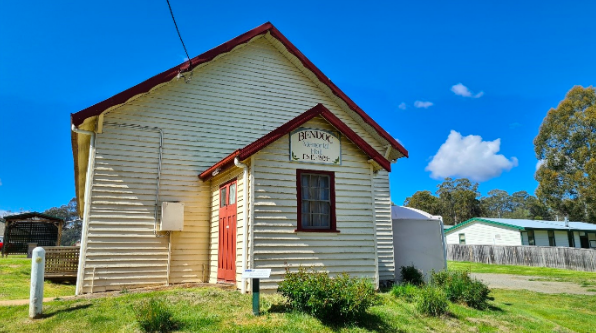
SSRV would like to thank Gippsland Community Legal Service – and in particular, Simone Elias – for inviting us to be part of the 2021 Farm Succession Planning Days and bringing this opportunity to life.
At the start of December 2021, I was fortunate enough to have had an opportunity for outreach in East Gippsland as part of our Bushfire Response Project. I’d like to take a moment to share a little about that experience, what we did, and what I learned from the experience.
Farm Succession Planning Days
Farm succession is an important issue for farmers and rural communities. What exactly happens when a farmer decides it’s time to stop personally working their land, and maybe give the next generation a go? What are the implications? How wide is the impact? And most importantly, how do you plan for it?
It was this we were hoping to help with as part of Bushfire Recovery Victoria’s Farm Succession Planning Days. Along with other legal and financial organisations working in the area, I presented at a series of sessions across East Gippsland, ranging from Bendoc and Bonang near the New South Wales border, to Genoa and Cann River in the east, and Gelantipy and Buchan in the hills west of the Snowy River.
My contribution was around Age Pension eligibility, and the special rules and particular circumstances that come up for farmers. As we were informed when planning the events, and was confirmed during the sessions themselves, Centrelink isn’t an option many farmers even consider.
“They won’t give me the pension, my farm is worth too much.”
But as it turns out, there are some very specific rules to make it easier for farmers in these situations to access the age pension. And that was my goal with these sessions. To raise awareness and give farmers more options to consider.
“Thank you. I would not have considered that as an option before speaking with you.”
The Farm Succession Planning Days were a great success, with farmers walking away with more options than they had before, both in this sphere and in those of the other presenters.
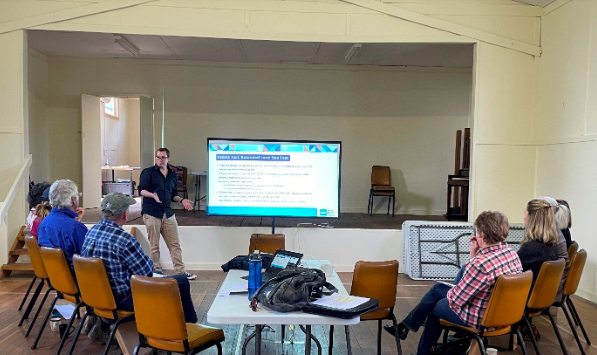
Reaching our to Rural Communities
What I found interesting were the differences between the farmers in each community. They each had a different feel and it was obvious that some were closer than others. It was also clear that each community had different issues on their minds, with some more focussed on ownership structures for their farms, and others very interested in enduring powers of attorney.
What was less surprising were the similarities. These were people who would outright tell you they were unlikely to pick up a phone and call you for help. Not if they haven’t met you before. Not if they can’t put a face to the name. And for me personally, that was the most valuable part of the trip: Making a connection with a cohort of people who would otherwise have difficulty accessing our service. I’m hopeful there will be more opportunities like this in the future for exactly this reason.
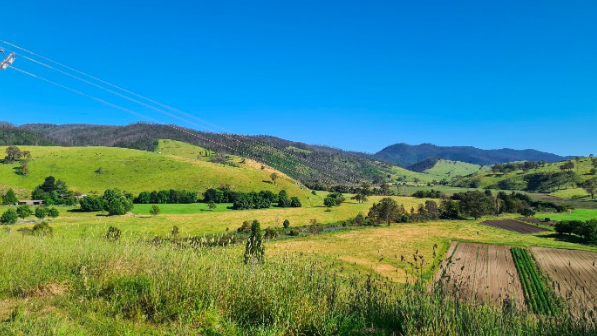
Responding to Bushfires as a Lawyer
I grew up in West Gippsland, so travelling down this way wasn’t new to me, though I hadn’t been this far east before. Something else that wasn’t exactly new was seeing the damage from fires. And yet, getting up close with it, even almost two years after Black Summer, is still confronting.
The moment that stands out to me was driving up to Gelantipy and seeing the trees that come right to the edge of the road on both sides just being completely burned out. Imagining what that must have been like at the time, if one was unlucky enough to find themselves stuck driving through that still elicits a strong emotional response.
The farmers’ own stories were far more confronting. Whether it was recounting their efforts to defend property, making the choice to stay or go, or just describing exactly how fast the fires could race up a hill. It was clear from the many conversations I had over the week, that just like the marks on the land, there will still marks on the people too.
And there were still practical – and legal – problems to solve. Fencing disputes, insurance issues, the Centrelink assets test, rebuilding, and accessing the Age Pension just to name a few. Working in this role I’ve seen the legal needs of bushfire affected people change over time. There’s a great demand for services – both on the ground and the specialists supporting them – to be resourced and ready to meet those needs at the time of an acute crisis. But disaster response doesn’t end there. Sometimes that help needs to come later, and sometimes it needs to be more general, to help a community get back on its feet holistically, and not just rebuild in the literal sense.
And that would be my final reflection on this trip. As community lawyers practising in a very specialised area we can’t solve every problem those affected by bushfires have. But with the right resources and approaches in place there is a role to be played and good to be done.
Plus it means you get to travel to some absolutely beautiful places.
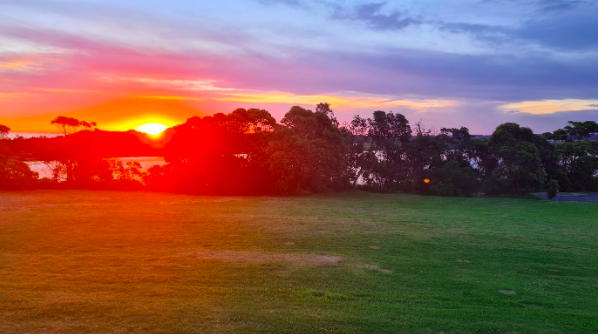
Did you know?
If you are affected by a disaster, you may be eligible for a payment from Centrelink.
There are often disaster relief payments available through Centrelink following a disaster. These payments are usually specific to a declared disaster or event. The payments include lump sum payments and short-term ongoing payments.
These are examples of recent disaster payments:
· Pandemic Leave Disaster Payment – to support people who have lost income due to COVID-19 quarantine.
· Victorian Storms and Floods, June 2021
– Disaster Recovery Payment – to support people who were seriously affected by the storms and floods in Victoria in June 2021
– Disaster Recovery Allowance – to support people who lost income as a result of the storms and floods in Victoria in June 2021.
· MH17 Family Support Package – to support family members of Australian victims of the downing of Malaysia Airlines flight MH17 who attend legal proceedings in the Netherlands.
Crisis payments are also available through Centrelink. These payments are available for people experiencing extreme circumstances which are not covered by a specific disaster relief payment.
The eligibility requirements for disaster and crisis payments can be found on the Centrelink website.
These payments, from the Australian Federal Government, recognise the impacts that disasters can have on people’s finances.
SSRV has commissioned a project to optimise our capability to respond to the social security needs of people affected by natural disasters.
We recognise that disasters can quickly lead to complex situations, affecting multiple aspects of people lives, including confusion or trouble with social security payments.
Our Disaster Preparedness and Response Plan will tackle this challenge from a range of perspectives. Find out more.


